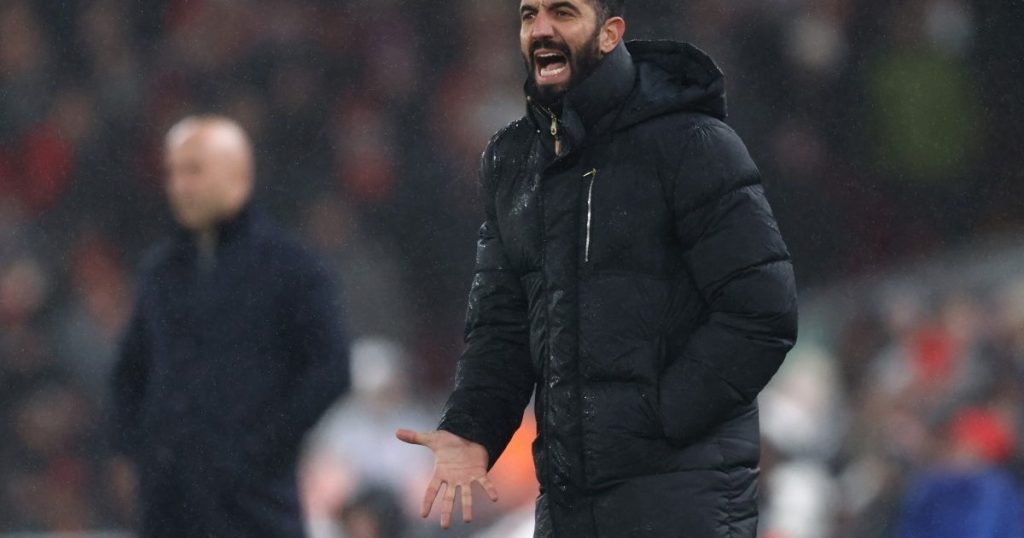Manchester United’s 1-0 home defeat to Wolves laid bare the deep-seated issues plaguing the club, a stark contrast to the fleeting euphoria of their Europa League quarter-final victory just days prior. Manager Ruben Amorim, candid in his post-match assessment, admitted that his team “lacks a lot,” highlighting the persistent struggles that have seen them languish in the lower reaches of the Premier League table. The loss, their 15th of the season, marks a new club record for defeats in the Premier League era, underscoring the magnitude of the challenge facing Amorim and his squad. While acknowledging his team’s superior performance in terms of possession and chance creation, the Portuguese manager lamented their inability to convert these opportunities into goals. This recurring theme of profligacy in front of goal has become a defining characteristic of United’s season, and it was ultimately their undoing against a resolute Wolves side.
The solitary goal, a Pablo Sarabia free-kick, was enough to secure all three points for the visitors, who celebrated their fifth consecutive top-flight victory, a feat they last achieved in 1970. This contrasting narrative of Wolves’ resurgent form and United’s continued struggles further emphasized the gulf in performance between the two sides. Amorim, who took the reins from the sacked Erik ten Hag in November, has overseen only six league victories in his 22 matches in charge, a statistic indicative of the club’s ongoing instability. His frustration was evident as he addressed the team’s shortcomings, acknowledging the need for significant improvement in several areas. The manager emphasized the importance of working with his players, analyzing video footage, and implementing strategies to address their deficiencies, recognizing that this process will require time and patience.
United’s attacking woes have been particularly acute, with Danish striker Rasmus Hojlund emblematic of the team’s struggles in front of goal. Hojlund, along with his fellow forwards, failed to find the net against Wolves, extending his own personal goal drought to a worrying 28 games with just one goal scored. Amorim, however, refrained from singling out Hojlund, pointing to similar missed opportunities by other players and emphasizing the collective responsibility for the team’s lack of goals. He stressed the need for a team-oriented approach to improve their attacking output, rather than placing undue pressure on any individual player. While acknowledging Hojlund’s primary role as a goalscorer, Amorim highlighted the importance of supporting him and providing opportunities for him to regain his confidence and form.
The manager’s comments reflect a broader understanding that goalscoring is a collective effort, requiring contributions from multiple players across the pitch. He acknowledged the pressure on Hojlund to break his goal drought, but emphasized the importance of providing him with the necessary support and opportunities within the team’s attacking framework. The manager’s unwavering belief in Hojlund’s potential was evident, as he expressed confidence that the striker’s breakthrough would come with continued work and patience. Amorim’s focus on the team’s collective performance and his refusal to place blame solely on Hojlund underscore his understanding of the complex dynamics at play within the squad.
The challenge facing Amorim is multifaceted, extending beyond simply improving the team’s goalscoring prowess. He needs to instill a sense of confidence and resilience in a squad that has endured a tumultuous season marked by managerial changes and inconsistent performances. Building a cohesive unit capable of consistently competing at the highest level will require addressing both the tactical and psychological aspects of the game. The upcoming Europa League semi-final against Athletic Bilbao presents an opportunity for United to salvage some pride and end their season on a positive note. However, overcoming a strong Bilbao side will require a significant improvement in performance, particularly in the final third of the pitch.
The path to recovery for Manchester United is undoubtedly a long and arduous one. The club’s current predicament demands a comprehensive overhaul, addressing issues ranging from player recruitment and tactical approach to fostering a winning mentality within the squad. Amorim’s candid assessment of his team’s deficiencies, while sobering, provides a starting point for this rebuilding process. The manager’s emphasis on patience and incremental improvement suggests a realistic understanding of the challenges ahead. The true measure of his leadership will lie in his ability to implement effective solutions and guide his team towards a more sustainable and successful future. The remaining games of the season, including the Europa League semi-final, will serve as a crucial testing ground for Amorim’s methods and provide valuable insights into the team’s progress under his guidance.


